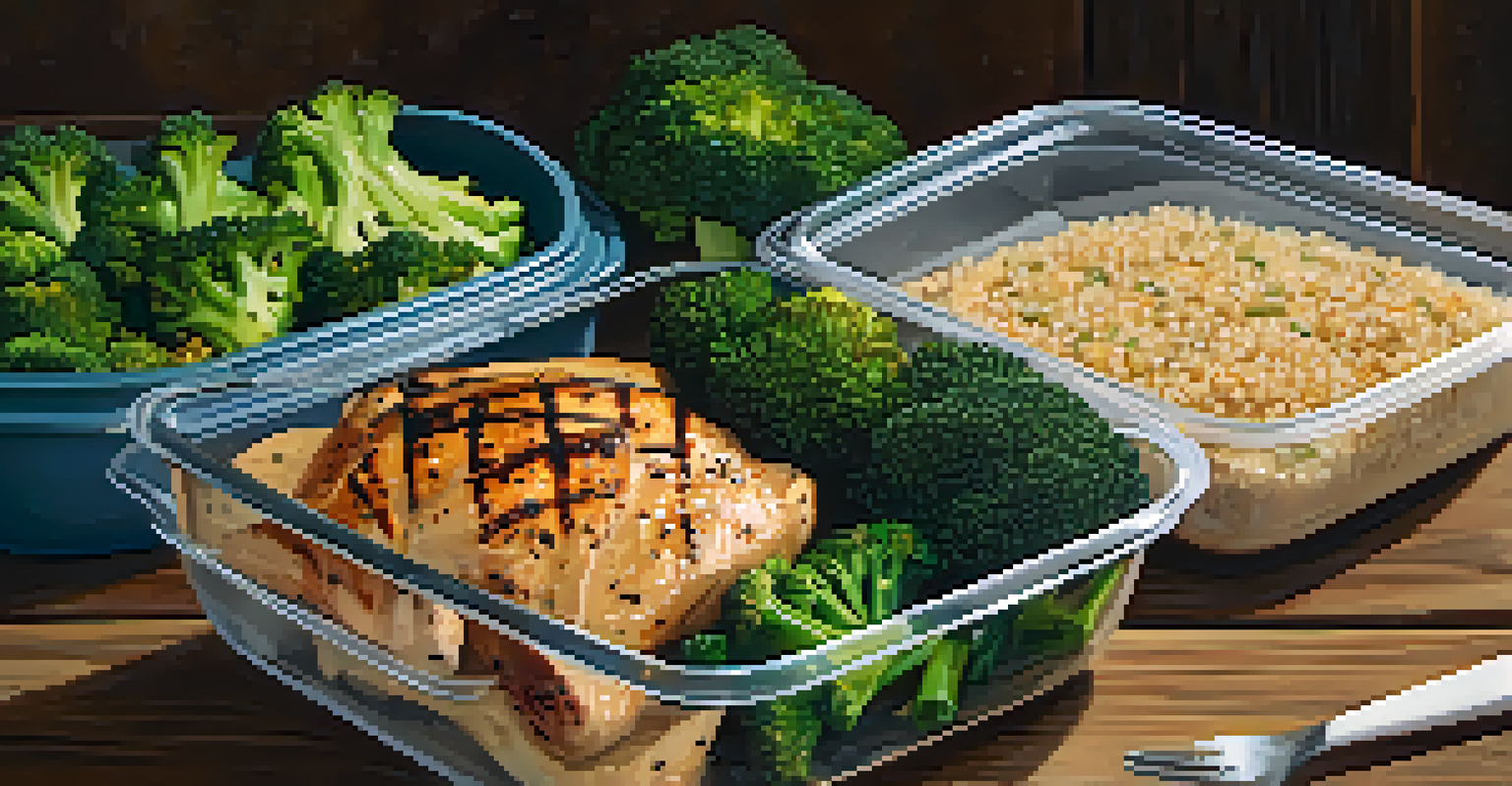Nutrition Guidelines: Bodybuilding for Fat Loss Success

Understanding the Role of Nutrition in Bodybuilding
Nutrition is the foundation of any successful bodybuilding journey, especially when fat loss is the goal. The right balance of macronutrients—proteins, fats, and carbohydrates—can significantly impact your body composition. Think of your body as a finely-tuned machine; it runs best on high-quality fuel. Without proper nutrition, even the most rigorous training won't yield the desired results.
You are what you eat, so don't be fast, cheap, easy, or fake.
When you're aiming to lose fat while building muscle, it's crucial to focus on nutrient-dense foods. This means choosing whole foods that provide vitamins, minerals, and other essential nutrients that support your body's functions. For example, lean proteins like chicken or tofu help repair muscle, while healthy fats from avocados or nuts provide sustained energy. By prioritizing these foods, you create a solid foundation for your bodybuilding efforts.
Moreover, understanding how your body responds to different foods can help you tailor your nutrition plan. Everyone's body is unique, and what works for one person may not work for another. By tracking your meals and their effects on your energy levels and performance, you can make informed adjustments to optimize your nutrition strategy.
Calculating Your Caloric Needs for Fat Loss
To embark on a fat loss journey, the first step is understanding your caloric needs. This involves calculating your Total Daily Energy Expenditure (TDEE), which considers your base metabolic rate and activity level. You can use online calculators or consult a nutritionist to get a more accurate estimate. Once you have this number, you can create a caloric deficit to promote fat loss.

Creating a caloric deficit means consuming fewer calories than your body burns. However, it's essential to do this safely and sustainably. A common approach is reducing your daily intake by 500 to 750 calories, which can lead to a gradual weight loss of about 1 to 2 pounds per week. This approach ensures you’re losing fat while retaining muscle, which is crucial for bodybuilders.
Nutrition Fuels Bodybuilding Success
A balanced intake of macronutrients is essential for optimizing body composition and achieving fat loss while building muscle.
Keep in mind that drastic calorie cuts can lead to muscle loss and metabolic slowdown. Instead of slashing your intake too much, focus on making smarter food choices and incorporating regular exercise. This balanced approach not only helps you shed fat but also keeps your energy levels high throughout your workouts.
The Importance of Protein for Muscle Preservation
Protein is often dubbed the building block of muscle, and for good reason. When you're in a caloric deficit, adequate protein intake becomes even more critical for preserving lean muscle mass. Aim for about 1.2 to 2.2 grams of protein per kilogram of body weight, depending on your activity level. This ensures your body has the necessary amino acids to repair and build muscle tissue.
The groundwork for all happiness is good health.
Incorporating a variety of protein sources can make meeting your goals easier and more enjoyable. Lean meats, fish, eggs, dairy, legumes, and plant-based proteins like quinoa are all excellent choices. Not only do they provide the essential nutrients your body needs, but they also help keep you feeling full, making it easier to stick to your calorie goals.
Additionally, spreading your protein intake throughout the day can enhance muscle protein synthesis. Instead of consuming a large amount of protein in one meal, aim for smaller portions at each meal and snack. This strategy helps maintain a steady supply of amino acids, supporting muscle growth and recovery.
Choosing the Right Carbohydrates for Energy
Carbohydrates play a significant role in fueling your workouts and supporting recovery, especially in bodybuilding. However, not all carbs are created equal. Focus on complex carbohydrates, such as whole grains, fruits, and vegetables, which provide sustained energy and essential nutrients. These foods also have a lower glycemic index, meaning they won't spike your blood sugar as quickly as simple sugars.
Incorporating carbohydrates around your workout times can optimize your performance. Eating a carbohydrate-rich meal or snack before and after your training can provide the energy you need and help replenish glycogen stores post-workout. For instance, having a banana before a workout and brown rice after can be a great strategy.
Protein Preserves Lean Muscle Mass
Consuming adequate protein is crucial during a caloric deficit to maintain muscle mass and support recovery.
While it’s essential to include carbs in your diet, be mindful of portion sizes and overall balance. Even healthy carbs can contribute to weight gain if consumed in excess. Monitoring your carbohydrate intake and adjusting based on your training intensity can help you maintain your energy levels while supporting your fat loss goals.
Healthy Fats: Essential for Hormonal Balance
Healthy fats are often misunderstood and unfairly demonized in weight loss discussions. However, they play a crucial role in hormone production and overall health, especially for bodybuilders. Hormones like testosterone and cortisol are vital for muscle growth and fat loss, and they require healthy fats to be produced efficiently. Incorporating sources like avocados, olive oil, and fatty fish into your diet can support these processes.
Moreover, healthy fats help with nutrient absorption. Vitamins A, D, E, and K are fat-soluble, meaning your body needs fat to absorb them effectively. By including healthy fats in each meal, you can ensure that you're getting the most out of the nutrients in your food, which is particularly important when you’re on a caloric deficit.
Finally, don’t forget about the satisfaction factor. Healthy fats can enhance the flavor and texture of your meals, making it easier to stick to your nutrition plan. A small handful of nuts or a drizzle of olive oil can elevate a dish, keeping your meals enjoyable and varied.
The Role of Hydration in Fat Loss and Performance
Hydration is often overlooked but is a key player in fat loss and performance. Water is essential for digestion, nutrient absorption, and overall metabolic processes. When you're well-hydrated, your body functions optimally, which can enhance your workouts and recovery. Aim to drink at least 2 to 3 liters of water daily, adjusting for activity level and climate.
In addition to plain water, you can include hydrating foods like fruits and vegetables in your diet. Foods like cucumbers, watermelon, and oranges have high water content and can contribute to your daily hydration goals. These foods also provide essential vitamins and minerals that support overall health and performance.
Hydration Supports Performance
Staying properly hydrated is vital for digestion, nutrient absorption, and enhancing workout performance.
Finally, listen to your body. Thirst is a natural signal that you need more fluids. If you find yourself feeling fatigued or experiencing headaches, it might be a sign that you need to rehydrate. Staying on top of your hydration not only supports fat loss but also helps you feel your best during those tough training sessions.
Meal Planning Tips for Bodybuilding Success
Effective meal planning can make a world of difference in your bodybuilding journey. By preparing your meals in advance, you can ensure that you have healthy options available, reducing the temptation to stray from your nutrition plan. Start by dedicating a few hours each week to plan and prep your meals. This could involve batch cooking proteins, chopping vegetables, and portioning out snacks.
Incorporate a variety of foods in your meal prep to keep things interesting. Experiment with different recipes and flavor combinations to avoid meal fatigue. For instance, try marinating chicken in different spices or making stir-fries with seasonal vegetables. The more you enjoy your meals, the easier it is to stick to your plan.

Lastly, don’t forget to account for flexibility in your meal planning. Life can get busy, and there will be days when plans change. Having a few quick, healthy recipes or options on hand can help you stay on track without feeling deprived. This balance of structure and flexibility is key to long-term success in bodybuilding and fat loss.